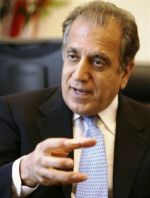UN resolution to speed up Darfur troops deployment – US
July 23, 2007 (UNITED NATIONS) — The U.S. ambassador to the United Nations said Monday that Security Council members were finalizing a new draft resolution on Darfur that he hopes will speed up the deployment of a U.N.-African Union peacekeeping force to the troubled region.

“The planners are here looking at the timeline issue and whether things could happen at a faster pace because it’s in our interest to have an effective on the ground as soon as possible,” he told reporters at U.N. headquarters.
He said the U.S., U.K. and France hope to have a draft resolution ready to circulate to Security Council members this week, although they are still making changes to alleviate the concerns of some countries on the 15-member council and Sudan.
A previous draft resolution by the U.K., France and Ghana earlier this month ran into stiff opposition from South Africa, whose ambassador called it “totally unacceptable.”
Sudan’s U.N. ambassador, Abdalmahmood Abdalhaleem Mohamad, told The Associated Press in an interview that Khartoum still has “some problems regarding the mandate” of the force. He said Sudan wants to guarantee there will be an African commander of the force and an exit strategy for the troops to ensure “they do not stay forever.”
The beleaguered 7,000-member A.U. force currently in Darfur has been unable to stop fighting between ethnic African rebels and pro-government janjaweed militia that has killed more than 200,000 people and displaced 2.5 million in the last four years.
The U.N. and Western governments have pressed Sudan since November to accept a U.N. plan for the hybrid force to replace the A.U. troops, but Sudanese President Omar Al-Bashir delayed action for months. In April, Sudan agreed to a “heavy support package” to strengthen the A.U. force, including 3,000 U.N. troops, police and civilian personnel along with aircraft and other equipment.
In Khartoum, al-Bashir ended a tour of Darfur on Monday and described the region as largely peaceful.
“If one talks of lack of security, then it is not in Darfur. What they are talking about is Iraq, Palestine or Afghanistan, and I challenge them all to come here,” the president said in a statement carried by the official media in West Darfur state capital of El Geneina.
Sudanese officials have repeatedly stated that Darfur is pacified since a May 2006 peace deal signed by the government and one rebel group. But the U.N. and international observers say violence has only worsened in the region since the agreement was signed.
Khalilzad said that while the U.S., U.K. and France were willing to negotiate on minor issues in the draft, the countries were adamant about maintaining three core elements: that a single commander controls the force, a timeline be set for deploying the force as expediently as possible, and the resolution be mandated under Chapter 7 of the U.N. Charter.
Chapter 7 deals with threats to peace and security and can be enforced through a range of measures, from breaking diplomatic and trade relations to military intervention.
Asked whether Sudan would agree to referring to Chapter 7 in the draft, Abdalhaleem said: “We are still discussing that with them. We would love to see the limits of the mandate.”
Meanwhile, a congressional delegation led by U.S. House Majority Leader Steny Hoyer and Representative Ileana Ros-Lehtinen, the ranking Republican on the House Foreign Affairs Committee, met with Secretary-General Ban Ki-moon and Khalilzad in New York to urge them to move quickly on the Darfur crisis.
Hoyer said the group also consulted with the Chinese and Egyptian ambassadors to the U.N. on using their influence with Sudan to push the country to allow the hybrid force to enter Darfur.
China, which imports two-thirds of Sudan’s oil, has opposed harsh measures against Sudan over the Darfur conflict. It is one of the five veto-wielding members of the Security Council.
(AP)
